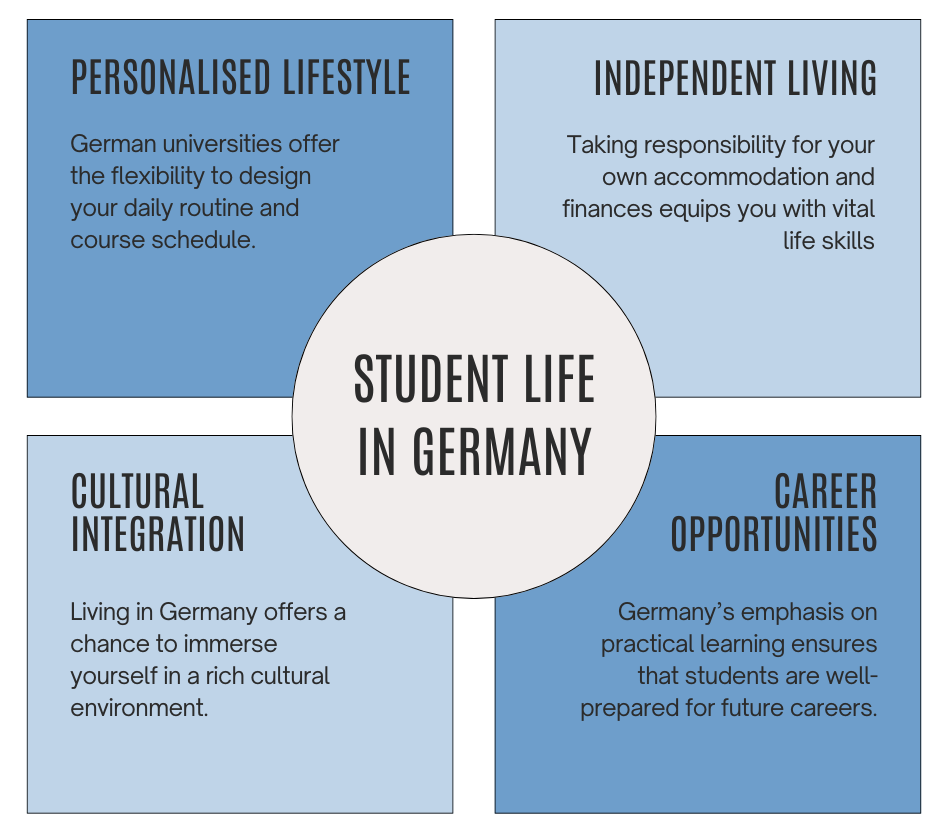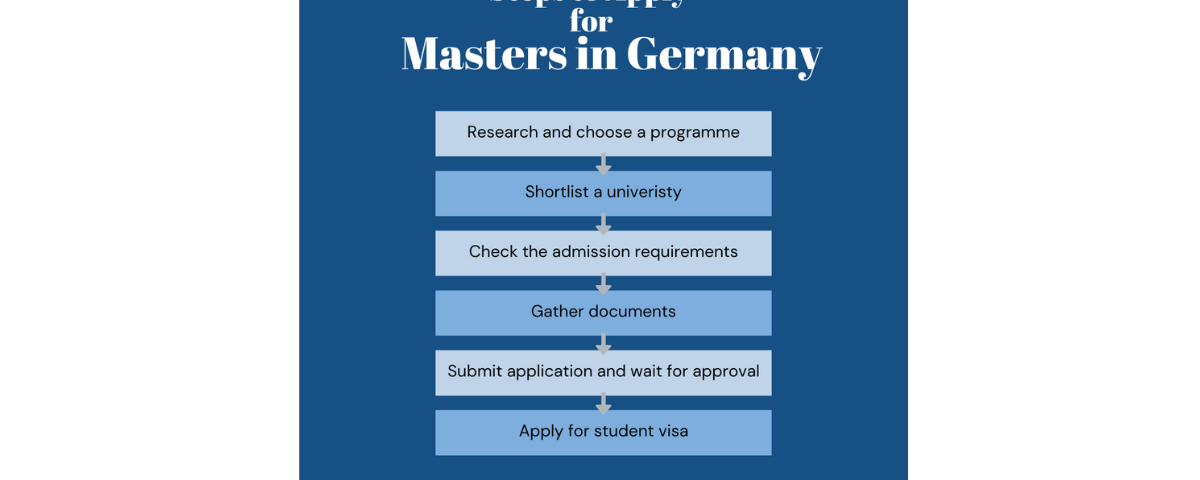
The Ultimate Guide to Studying Tourism and Recreation in Germany
July 12, 2024
Unlocking Excellence: Exploring the Unique Offerings of European Universities in Germany
July 22, 2024Top Reasons to Pursue Your Master's Degree in Germany: A Guide for International Students
Germany stands out globally for its renowned universities and exceptional education system, making it a sought-after destination for international students. With over 420 higher education institutions and more than 21,000 diverse study programmes, including various options for a Master's Degree in Germany, the country offers a wealth of opportunities for academic and professional growth. German universities are committed to maintaining high academic standards and attracting leading scholars and researchers from around the world. This global collaboration fosters a vibrant, multicultural learning environment that prepares students to excel in an interconnected world.
Moreover, studying in Germany is not just about academics. The country's rich cultural heritage, vibrant cities, and picturesque landscapes offer a well-rounded experience. Students have the chance to immerse themselves in German culture, learn the language, and explore the country's history and traditions. In summary, Germany's exceptional education system, diverse programmes, and inclusive cultural experience make it an ideal destination for students aiming for academic excellence and personal growth.
Why Study in Germany?
- Outstanding Education System: Germany is universally known as one of the top choices for international students. The nation is recognised for providing an exceptional education system with top-tier universities, cutting-edge technology, and a diverse, inclusive academic environment.
- Diverse Programmes: Germany offers almost 21,000 programmes, giving students various options to explore and choose from. There is a study programme in Germany that is suitable for you, regardless of your current academic status.
- Affordable Tuition Fees: Compared to other countries like the UK or the USA, Germany offers programmes at a lower price. So, in Germany, you can study at top-ranked universities at an affordable price.
- Industry Connections: German universities emphasise practical learning and value internships and real-life projects. These activities give students the chance to build connections with industry professionals, which will be helpful for their careers.
- Career Opportunities: A degree from a German university is globally recognised and opens a world of career opportunities. The practical, hands-on experience of the Geman education system gives students a head start on their professional journey.
- Rich Culture Experience: Germany is home to people from different cultural backgrounds, making the country rich in diversity. This benefits students by introducing them to other cultures, enhancing their global perspective, and allowing them to build connections, enriching their personal and professional lives.
How to apply for a Master's Degree in Germany

Many options are available for students pursuing their Master’s degree in Germany. Many of the programmes are available in English for international students. Since Germany offers a wide range of programmes, students can choose one that suits their interests. Consider the following steps before applying for a Master's degree in Germany:
- Research and choose the right programme: Research is essential before selecting the right programme for your Master's degree. Make a list of academic programmes that interest you and identify the universities that offer degrees in those fields. Shortlist the programme and university and start your application process.
- Check the admission requirements: Look for the admission requirements listed by the university, usually on their website, and check if you meet all the requirements. The needed documents commonly consist of your bachelor's degree transcripts, Curriculum Vitae (CV), statement of purpose, letters of recommendation, and proof of language proficiency. Depending on your university’s language requirements, i.e., English or German, you may need to submit proof of proficiency (like IELTS or TOEFL scores).
- Meet all the requirements and gather documents: After reviewing the admission requirements and your eligibility to apply for admission, it is time to start collecting the required documents.
- Apply: Re-check the documents before applying to the university. Note down the universities' deadlines that interest you, and make sure that you submit the applications before the deadline.
- Wait for the admission letter: Once you have submitted your application, you only need to wait for the university’s approval. While you wait, you can look for health insurance, accommodation options near your university, and travel requirements to Germany.
- Apply for a student visa: Students who aren’t from an EU/EEA country must apply for a student visa. When applying, you must submit your passport, proof of financial resources, and previous academic documents.
Financing Your Studies
As an international student, you should make a financial plan for your studies. Below are some of the standard options:
- Scholarships: German universities offer different types of scholarships to international students. Check with your university for available scholarships. These scholarships can significantly reduce your tuition fees and living expenses. You can check with the university you are applying to for their scholarship options.
- Part-Time Work: Germany allows international students to work part-time while studying. Students from EU/EEA countries can work up to 20 hours per week and full-time during their studies. Students from non-EU/EEA countries can work for only 240 half days or 120 full days per year, which can help them with their daily expenses.
- Savings and Financial Support from Family: International students usually rely on their parents' financial resources. It is essential to pre-plan your budget and expenses. Make sure that you have sufficient funds for your entire stay in Germany. It may be helpful to create a blocked account, as it helps you keep your savings.
- Student Loans: Student loans are another option you can choose from. Some countries offer student loan programmes to finance students' studies abroad. Some German banks also offer student loan programmes, but they tend to be restricted to students with favourable conditions.
- Cost of Living: Germany has a relatively lower cost of living than other European countries. Transportation costs are reasonably inexpensive, and food prices are average for Europe. When planning your budget, it is essential to consider accommodation, food, transportation, health insurance, and other personal expenses.
Student Life in Germany

Studying in Germany gives students a lot of independence to tailor their lifestyle and create a routine that benefits their interests and needs. While pursuing your Master's degree in Germany, you will solely be responsible for your accommodation, food, travel, and all the other finances, providing you with personal development and greater independence.
Personalised Lifestyle: Studying abroad in Germany gives you more time for yourself. With this flexibility in time, students can manage their time effectively. This offers students equal time for their academic lives and time for their social activities and interests, giving them a balanced student experience.
Independent Living: Taking charge of their finances and shelter teaches students valuable life lessons. Students will learn essential life skills like how to budget, how to be self-reliant and how to manage their time effectively. These experiences will help you prepare for life outside of university, making you more confident and capable.
Shared Facilities: Some German universities collaborate and share facilities, which allows students to interact with students from different institutes. Joining student clubs and participating in campus functional programmes also helps them develop a broader social network. These interactions make the university experience more vibrant, exciting, and memorable for the students.
Cultural Integration: Germany is rich in history and culture, and you can experience both natural landscapes and busy city life in Germany. Students can experience the vibrant local festivals, explore the fascinating historical sites, and delve into the country's rich traditions during their stay. These experiences enhance the student's personal growth and give them a deeper understanding of German culture.
Career Opportunities: German universities focus on practical learning, which prepares students well for their careers. Internships and real-life assignments help students experience valuable skills and build industry connections, making them competitive candidates in the job market worldwide.
Interested in Studying in Germany?
Studying in Germany as an international student comes with a plethora of exciting benefits and opportunities. With globally recognised universities that provide a wide range of Master's programmes at affordable prices, Germany has quickly become the top destination for students worldwide. The country’s robust education system and vibrant student life make it an excellent educational location.
If you are interested in studying Hospitality or Tourism and Recreation in Germany, you can apply to the European Institute of Innovation, Entrepreneurship, and Technology (EIIET). The institute is in Berlin and offers diverse academic programmes, including a Bachelor's and Master's in Tourism and Recreation and an Executive MBA in the HoReCa industry. It provides students with theoretical knowledge and practical experience in a dynamic and culturally rich environment. At EIIET, programmes are taught in English, making it an excellent choice for international students who do not speak German.
Contact us and learn more about the Master's programmes offered by EIIET.

